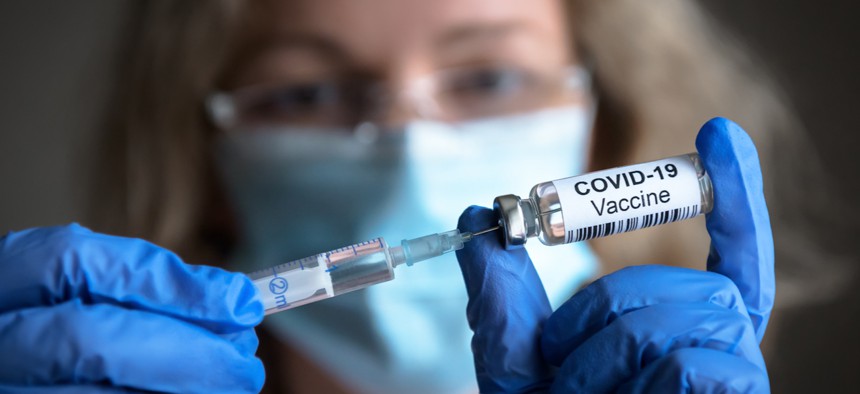
Shutterstock.com
Officials Still Fighting for Vaccine Distribution for D.C.-Area Feds Despite Initial Rejection
Lawmakers caution the Biden administration against “foisting” feds onto state vaccination programs.
Appeals to the Biden administration for help vaccinating federal workers in the Washington, D.C., region are so far falling on deaf ears, but leaders continue to press for special dose distributions.
Officials in the metro area said they remain “optimistic” they can convince the Federal Emergency Management Agency and the Centers for Disease Control and Prevention to change their minds. Governors Ralph Northam, D-Va., and Larry Hogan, R-Md., along with D.C. Mayor Muriel Bowser, D, have pushed the Biden administration to provide direct vaccine distributions for 30,000 frontline federal workers in their jurisdictions, arguing those personnel are “the direct and sole responsibility” of the federal government. While officials said the conversations are ongoing, FEMA so far has made clear it has no intention of fulfilling the request.
“We’re optimistic that we can continue to keep the dialogues and discussions going with FEMA and get a different decision on how we will approach federal workers with a supplemental supply of vaccine,” said LaQuandra Nesbitt, director of the city's health department.
Local officials received a boost in their efforts on Thursday, with federal lawmakers in the area writing a letter to CDC Director Rochelle Walensky and acting Office of Personnel Management Director Kathleen McGettigan arguing that the federal government should make a direct allocation of vaccine for its own employees. Similar to the governors’ and mayor’s request, Virginia Reps. Don Beyer, Gerald E. Connolly and Jennifer Wexton; Maryland Reps. Anthony Brown, Jamie Raskin and David Trone; and D.C. Del. Eleanor Holmes Norton—all Democrats—said the concentration of federal workers in the region would place an undue burden on local governments’ vaccination efforts.
“Rather than foisting federal employees into Virginia, D.C., or Maryland’s supply of vaccines and increasing their essential worker vaccination responsibilities, the federal government should vaccinate federal employees through a separate federalized allocation to get them vaccinated as soon as possible,” the lawmakers said.
Aaron Fritschner, a spokesman for Beyer, said the group has not yet had any communication with CDC or OPM, but is hopeful its influence can “increase the pressure” to get the Biden administration to reverse its stance.
“This seems like a pretty obvious thing to do, to us,” Fritschner said.
A FEMA spokesperson who declined to be identified suggested the administration has not yet made a final determination, saying the request from the governors and mayor “is currently under review.”
“FEMA reviews all requests from states, territories and tribes that are submitted and is working with our partners to provide federal support through deployment of personnel, equipment and supplies, and expedited funding to assist, augment and expedite vaccines to everyone in America,” the spokesperson said, adding that decisions on specific allocations are made at the local level.
Most agencies have struggled to secure vaccine doses for their workforces, with only five receiving direct distributions for internal use. Management in many cases has communicated to frontline employees that they are eligible for prioritized access, but has done little to assist in actually getting them inoculated. The Homeland Security Department has partnered with the Veterans Affairs Department to get its workforce vaccinated, but the initiative has been slow to get off the ground. VA’s internal effort has been successful, vaccinating 275,000 of its own employees and more than 1 million veterans.
President Biden in his first days in office created a task force to, among other things, develop policies to prioritize federal employees for vaccinations. To date, that group has not issued any such plan aside from instructing agencies to allow employees to take paid administrative leave in order to receive their inoculations.







